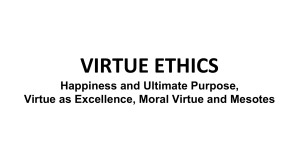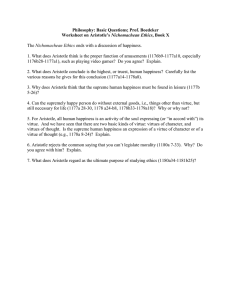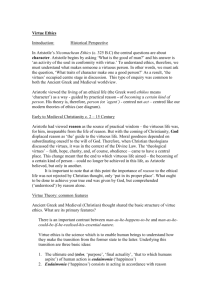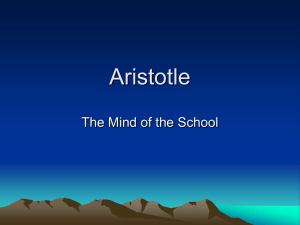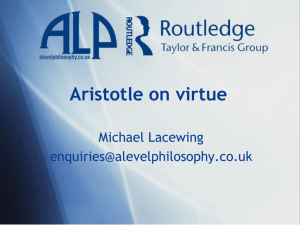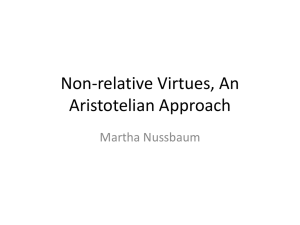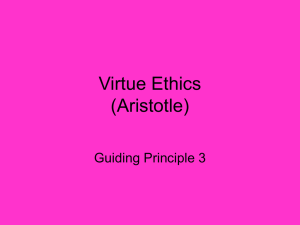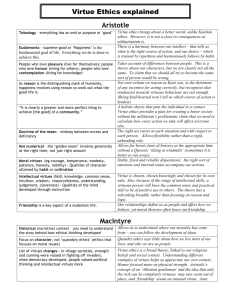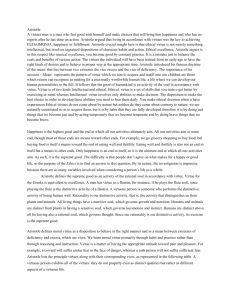Aristotelian Ethics
advertisement
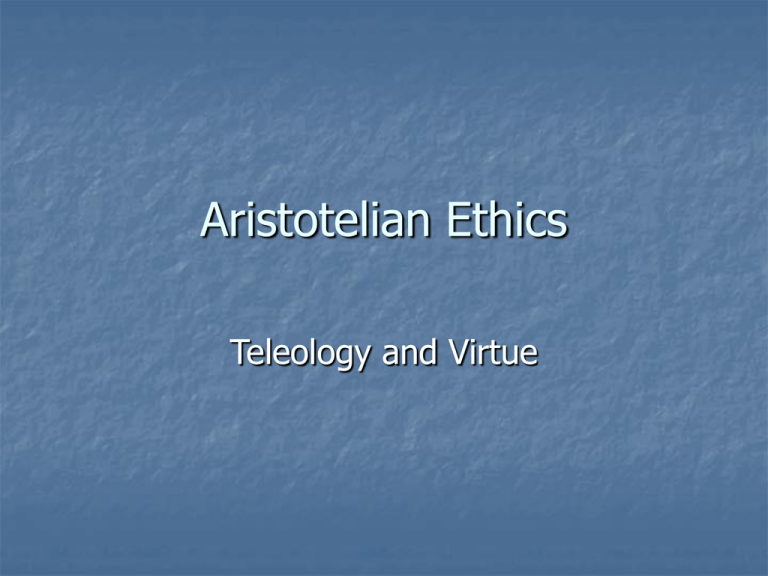
Aristotelian Ethics Teleology and Virtue Aristotle (382-322 B.C.E.) Student of Plato in Socratic tradition Originally a botanist Scientific, analytical mind that categorizes and systematizes Writes several extended essays on areas of philosophy Eg. Politics, Poetics, Ethics Nicomachean Ethics Written for his son, Nicomachus Organized in order of predominant virtues and building to study of highest human goal = happiness 1st: Practical virtues (courage, temperance, justice, and prudence) 2nd: Friendship 3rd: Pleasure and happiness Teleology Aristotle grounds his ethical theory on the assumption that all things have an essential purpose, goal, end Telos = the final cause, or goal, of an object Most natural objects have at least one end Ethics is determined by using all natural objects toward their intended or proper end Teleology (cont.) The telos of human beings is: eudaimonia = happiness or complete well-being Is an end in itself without further end Recognizing objective characteristics of the human being, there are objective elements to happiness Not just happy b/c you think you are Must be rightly ordered within - virtuous Virtues and Character As ethos is character, we must ask “How does one build character to do the proper act that leads to happiness?” Must acquire virtues = good habits Avoid corruption of person in vices Cardinal virtues are: 1. fortitude (courage); 2. temperance; 3. justice; 4 prudence Virtue Acquisition Acquiring virtues requires first that we “know thyself” words on oracle’s Temple at Delphi Human beings are made up of 3 parts: 1. rational – mind 2. appetitive – emotion 3. vegetative - physical Virtue Acquisition (cont.) We learn by doing virtuous deeds Cf. recursive nature of ethics Jump into the cycle and do it “The just man justices. . .” G.M. Hopkins Virtue is often the “golden mean” or the average of extreme behavior Although relative to each person, look to examples for balanced behavior Character Types Spectrum of Virtuous Character Questions of if one can: A. judge right from wrong B. put appetites in line with reason C. do the right thing In the most vicious cases, reason is so corrupt, cannot understand virtue Virtuous Continent/Enduring Incontinent/Soft Vicious/Self-Indulgent Aristotle and Christian Ethics Foundation of much teaching today Christianity believes all humans and creation have telos in God St. Thomas Aquinas comments on Ethics and uses Aristotle’s method for own Summa Theologiae Seek eternal communion with Creator Ties to Natural Law theory Virtue celebrated in scripture E.g. Beatitudes, parables, Wisdom, Proverbs Aristotle and Christian Ethics Aristotle differs on a number of points: Does not ground ethics in a loving, personal relationship with God or divine being Virtuous person is not to live “humbly” Not universal call to virtue, but best life and eudaimonia reserved for elite characters

